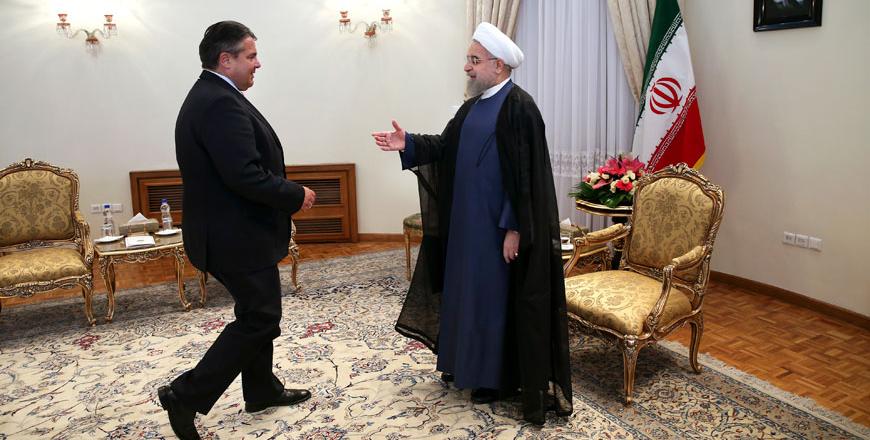You are here
Rouhani assures critics nuclear deal is good for Iran
By Reuters - Jul 23,2015 - Last updated at Jul 23,2015

Iranian President Hassan Rouhani (right) welcomes the German Vice Chancellor and Economy Minister Sigmar Gabriel at the start of their meeting in Tehran on Monday. Germany and Iran soon will hold their first economic conference in a decade in the wake of Iran’s nuclear deal with world powers, Iran’s state-run news agency reported on Monday (AP photo)
DUBAI — President Hassan Rouhani defended Iran's nuclear deal with world powers after it came under attack from conservatives at home, arguing on Thursday it reflected the nation's will and was "more valuable" than carping over the details.
While many Iranians hope last week's agreement will bring an end to sanctions and deliver prosperity, the elite Revolutionary Guards military force and conservative lawmakers have said it endangers the country's security.
"This is a new page in history," Rouhani said in a speech broadcast live on television, reiterating that the deal had launched a phase of reconciliation with the outside world.
Pinning his authority to the fate of the agreement, Rouhani added that this new era had not begun when it was reached in Vienna on July 14 but rather on August 4, 2013, the day Iranians elected him to solve the nuclear dispute.
The deal imposes curbs on Iran's nuclear programme in return for an easing of the international sanctions which have badly hurt its economy.
Iranian conservatives are not the only group unhappy with it. In the United States, Republicans who control Congress have also lined up against the agreement, although President Barack Obama says he will veto any congressional objection.
The Republican speaker of the House of Representatives, John Boehner, has promised to do "everything possible" to stop the deal. US Senator Ben Cardin, the top Democrat on the Senate Foreign Relations Committee, said on Thursday he had not yet decided how to vote on the agreement, although he acknowledged that U.S. negotiators had "got an awful lot".
US Secretary of State John Kerry also has the task of selling the agreement to sceptical US allies in the region. Israel is strongly opposed while Washington's Sunni Muslim-ruled Arab allies, led by Saudi Arabia, are wary of an arrangement that would benefit their rival, Shiite Iran.
In Jeddah, Saudi Foreign Minister Adel al-Jubeir told reporters that his country hoped the deal would curb rather than expand "Iran's interference in the region's affairs".
"We hope that Iran will make use of the deal's fruits to re-build their country and to improve their people's quality of living, not to use it to conduct more subversion in the region."
Jubeir added that any agreement should guarantee Iran's inability to get nuclear weapons and allow inspection of "all locations including the military locations".
Iran denies the nuclear programme aims to produce weapons.
The Revolutionary Guards have made it clear they will not permit any inspection of their military sites, and will not bow to any restriction on Iran's missile programme.
Rivalries
Chiding critics of the accord, Rouhani said he had noted some Iranian officials were "scrutinising one by one the terms of the deal" and a subsequent resolution endorsing it which the United Nations Security Council passed on Monday.
"That's good but what has happened is more valuable and more significant than that," he said.
"The agreement conveyed this message to the world: Never threaten an Iranian anymore. This agreement sent the message to the world that the most difficult and complex international issues can be resolved through negotiations. Iran's path is a path of moderation."
Many analysts see the chance of the Iranian leadership eventually rejecting the accord as small, since Tehran needs the lifting of sanctions to help its isolated economy.
Minister of Industry, Mines and Trade Mohammad Reza Nematzadeh outlined plans to rebuild its main industries and trade relationships following the deal, saying it was targeting oil and gas projects worth $185 billion by 2020.
Sanctions are unlikely to be removed until next year, as nuclear inspectors must confirm that Iran is complying with the deal.
The Iranian debate over the deal's details largely reflects internal rivalries in the country's cumbersome dual system of clerical and republican rule, in which factions jostle to gain maximum benefit from the deal while shouldering the least responsibility.
Iran's procedures for ratifying the accord are not known in any detail. Whatever the eventual role of parliament or the National Security Council, the deal will have to be approved by Khamenei, the country's highest authority.
Foreign minister and chief nuclear negotiator, Mohammad Javad Zarif, attended parliament on Tuesday to deliver the text of the deal and answer MPs' questions.
Ali Akbar Velayati, a senior adviser to Khamenei, said on Wednesday he did not know which person or body would have the final say on the deal but added "It seems the National Security Council has been assigned to examine the deal".
Related Articles
Failure to finalise a framework agreement between Iran and the six major powers aimed at curbing the country's sensitive nuclear work could profoundly destabilise the Islamic Republic, analysts and politicians say.
ANKARA — Iran's supreme leader said on Thursday he favoured a parliamentary vote on its nuclear deal reached with world powers and called fo
Iran's foreign minister has warned the United States that failure to agree a nuclear deal would likely herald the political demise of pragmatist President Hassan Rouhani, Iranian officials said, raising the stakes as the decade-old stand-off nears its end-game.
















